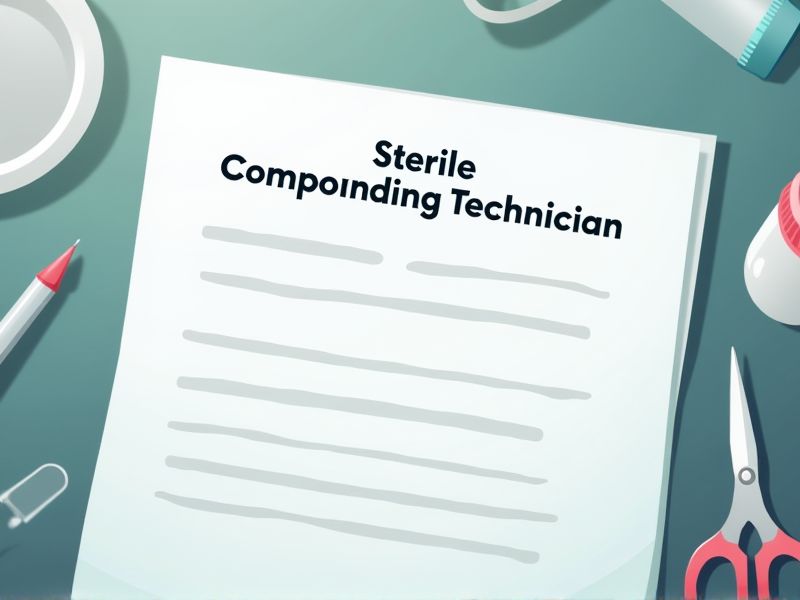
The role of a Sterile Compounding Technician involves preparing medications in a contamination-free environment, necessitating precision and adherence to stringent protocols. Certification ensures that technicians are equipped with the necessary knowledge to prevent errors and maintain safety standards. As regulatory demands and industry standards elevate, these credentials validate the technician's competence and commitment to maintaining public health. Here are some key certifications that are essential for Sterile Compounding Technicians.
Certified Sterile Compounding Technician (CSCT)
Certified Sterile Compounding Technicians, or CSCTs, ensure that medications are compounded in sterile environments, minimizing the risk of contamination and infection. Their certification provides proof of proficiency and adherence to stringent industry standards, which enhances patient safety. As regulations around pharmaceutical compounding become stricter, CSCTs play a crucial role in maintaining compliance with federal and state guidelines. The demand for these skilled professionals grows as healthcare facilities aim to improve quality control and patient outcomes.
USP <797> Sterile Compounding Certification
The USP <797> Sterile Compounding Certification is essential because it establishes standardized guidelines to ensure the safety and quality of compounded sterile preparations. Adherence to these standards helps compounding technicians minimize contamination risks and avoid potential harm to patients. Certification demonstrates a technician's proficiency and commitment to uphold industry best practices. Regulatory bodies and healthcare facilities often require this certification to maintain compliance and enhance patient safety.
USP <800> Hazardous Drugs Handling Certification
The USP <800> Hazardous Drugs Handling Certification is needed to ensure that sterile compounding technicians handle hazardous drugs safely, reducing the risk of drug contamination. Proper certification helps to protect healthcare workers from potential drug exposure that can lead to serious health issues. It aids in maintaining compliance with regulatory standards, preventing potential legal and financial repercussions for healthcare facilities. Training under this certification enhances technicians' competence and confidence, improving overall pharmacy operations and patient safety.
Pharmacy Technician Certification Board (PTCB) Credential
The PTCB certification for sterile compounding technicians demonstrates a standardized level of knowledge and competence in handling medications under sterile conditions, which is critical for patient safety. Without this credential, technicians may lack the thorough understanding required to prevent contamination that can lead to severe patient health complications. It also boosts trust from healthcare employers and patients, reinforcing confidence in the technician's skills and adherence to regulatory standards. This credential can enhance career opportunities and professional development within pharmaceutical roles.
National Pharmacy Technician Association (NPTA) Certification
The NPTA Certification for Sterile Compounding Technicians enhances credibility by ensuring adherence to industry standards and guidelines. It reduces medication errors, increasing patient safety through uniform training and comprehensive knowledge of sterile compounding practices. Employers often require this certification to comply with regulatory requirements and to maintain high-quality pharmacy services. Certification also fosters professional growth by providing technicians with updated skills and knowledge crucial for advancing in their field.
Cleanroom Operations Certification
Certification in cleanroom operations equips sterile compounding technicians with essential knowledge to maintain contamination-free environments, crucial for patient safety. It ensures adherence to stringent regulatory standards, such as those set by the United States Pharmacopeia (USP) for sterile preparations. By obtaining this certification, technicians demonstrate their competence in controlling factors like airflow and environmental cleanliness, directly impacting drug efficacy. Employers often require certification to mitigate legal risks and ensure compliance with health regulations, thus enhancing their facility's operational credibility.
Good Compounding Practices (GCP) Certification
Achieving Good Compounding Practices (GCP) Certification ensures adherence to quality standards, resulting in safer and more effective medications. This certification reduces the risk of contamination and errors in sterile compounding, safeguarding patient health. Regulatory compliance with GCP provides technicians with a framework to meet stringent industry requirements. GCP certification fosters trust among healthcare providers and patients, enhancing professional credibility and assurance.
OSHA Hazard Communication Certification
OSHA Hazard Communication Certification is essential for sterile compounding technicians because it ensures they understand the potential chemical hazards associated with the materials they handle. Proper certification reduces the risk of chemical exposure and contamination, ensuring a safer working environment. It informs technicians how to read and comprehend Safety Data Sheets, which are crucial for managing emergencies related to hazardous substances. This certification helps in maintaining compliance with federal regulations, which are designed to protect the health and safety of healthcare workers.
HAZMAT Awareness Certification
Sterile Compounding Technicians handle substances that may pose health risks, necessitating HAZMAT Awareness Certification to ensure safety. This certification enables technicians to recognize hazardous materials and implement appropriate safety protocols. Regulatory compliance requires proper handling and disposal of hazardous substances, making certification essential. Knowledge from this certification helps minimize contamination risks, ensuring patient and staff safety.
Infection Prevention and Control Certification
Infection Prevention and Control Certification is crucial for Sterile Compounding Technicians as it ensures they are equipped with the knowledge to minimize contamination risks, directly affecting patient safety. Completing this certification often results in a higher standard of hygiene practices, reducing the likelihood of healthcare-associated infections. Regulatory bodies mandate such certifications to align with legal compliance and industry standards in sterile environments. Knowledge from this certification enables technicians to implement evidence-based practices, ultimately improving overall healthcare outcomes.
Summary
When you obtain certifications as a Sterile Compounding Technician, you enhance your credibility and trustworthiness in the pharmaceutical sector. Certification often leads to increased job opportunities and higher earning potential, reflecting your advanced expertise. Employers typically prioritize certified technicians for critical roles, recognizing their adherence to industry standards. Consequently, you can expect greater job security and career advancement prospects.
